Ultimate Guide to Cockatiel Care: Habitat, Nutrition & Training
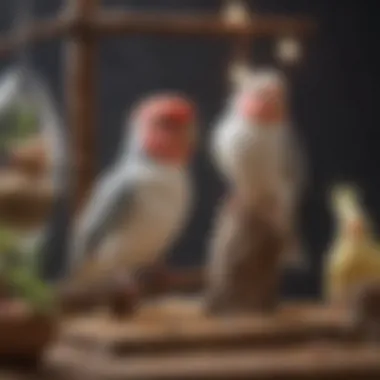
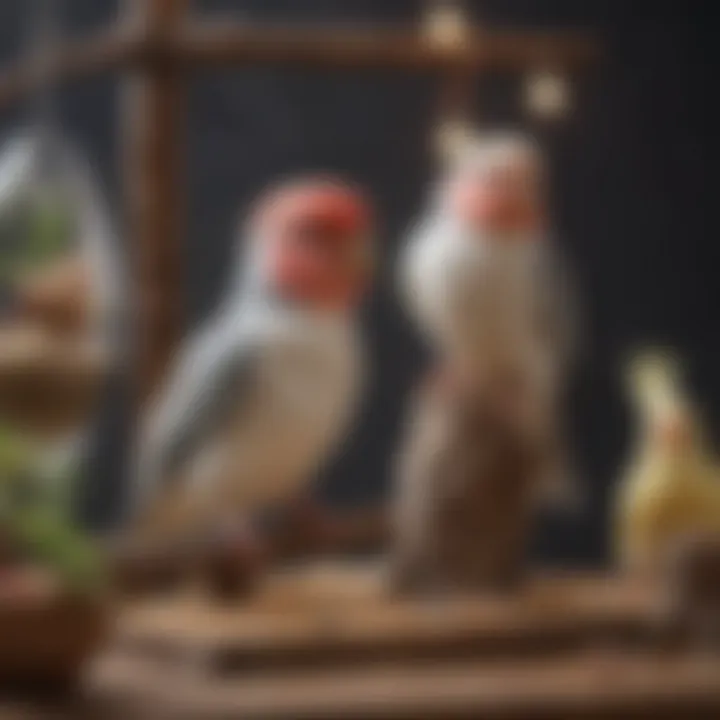
Intro
Caring for a cockatiel is much more than just providing a cage and some seeds. These charming birds, known for their playful personalities and incredible intelligence, require a well-thought-out approach to ensure they thrive. In this guide, we will walk you through the essentials of cockatiel care, touching on aspects like habitat setup, dietary needs, training methods, and fostering emotional well-being. Whether you're a first-time bird owner or someone with experience under your belt, understanding the intricacies of cockatiel care will greatly enhance the bond you share with your feathered friend.
Avian Care Basics
Importance of Proper Nutrition
A well-balanced diet is crucial for the health of your cockatiel. Unlike the notion of tossing a few seeds into a bowl and calling it a day, cockatiels thrive on a variety of foods. Providing a mix of high-quality pellets, fresh fruits, and veggies will keep their beak busy and their body nourished.
One simple way to mix it up is to introduce fruits like apples or leafy greens like kale into their daily meals. However, keep an eye on what they munch on; some foods like avocados and chocolate are no-gos for birds!
Understanding Bird Species and Their Needs
Different bird species come with their own unique needs. Cockatiels, for example, are social creatures who flourish in environments where they feel involved. They don't just need a cage; they need a space where they can interact with you and their surroundings. It's vital to understand that they enjoy routine but also need stimulation.
Basics of Birds Habitat Setup
Setting up the perfect habitat for your cockatiel isn’t solely about size, but also design. Ideally, their cage should be spacious, allowing them room to stretch and flap their wings. Adding perches of different thickness or texture keeps their feet healthy and engaged. A few toys for chewing or climbing will make their living space more engaging, encouraging play and exercise.
Grooming and Hygiene Tips
Just like with any other pet, proper grooming plays a significant role in a cockatiel's wellbeing. Regularly clipping their nails and checking their feathers can prevent health problems. Baths are also beneficial—most cockatiels enjoy a good spray with lukewarm water or a shallow dish to splash around in. This not only keeps them clean but also mimics their natural behavior.
Interacting with Your Pet Bird
Building Trust and Connection
Establishing a relationship with your cockatiel demands patience and understanding. Spend quality time near their cage, talking softly and offering treats. Before long, you'll find that your cockatiel comes to trust you, which is the cornerstone for successful training.
Training Techniques and Tips
Training a cockatiel doesn’t just involve teaching it tricks. It’s more about communication. Simple commands like "step up" can be taught through positive reinforcement. Offering rewards like their favorite treat encourages good behavior and strengthens your connection.
Fun Activities for Bird Owners and Their Birds
Playing together can create a stronger bond. Simple activities like offering a foraging toy or letting them explore a supervised area outside the cage keep their mind sharp and spirits high.
Recognizing Bird Cues and Behaviors
Understanding your bird's body language is key. A puffed-up cockatiel may be feeling defensive, while relaxed body posture suggests they are comfortable. Becoming adept at reading these cues will help you address their needs more effectively.
Emotional Well-Being of Birds
The Role of Play and Socialization
Cockatiels are remarkable social creatures who flourish with interaction. Providing time outside their cage and integrating them into family activities can help reduce feelings of loneliness.
Enhancing Birds' Emotional Health
Creating a stimulating environment is vital. Rotate toys and introduce new experiences to keep your bird's environment dynamic.
Assessing Bird Stress and Remedies
Stress can manifest in various ways—feather plucking or excessive squawking. If you notice changes in behavior, take a step back to assess potential sources of stress. This could be anything from loud noises to changes in routine.
Building Strong Human-Bird Bonds
The stronger the bond between you and your cockatiel, the easier it is to understand their needs. Regular interaction and consistent training establish trust, leading to an emotionally stable pet.
Bird Health and Safety
Common Health Issues and Prevention
Cockatiels are often prone to certain health problems, such as respiratory issues or obesity. A balanced diet and regular vet check-ups can mitigate many of these risks.
Routine Veterinary Care
Establishing a relationship with an avian veterinarian ensures any potential issues are caught early. Regular check-ups can greatly extend your bird's quality of life.
Environmental Hazards to Avoid
Be aware of hazards in your home environment. Things like ceiling fans, toxic plants, or even non-stick cookware can pose serious threats to your bird's safety.
Signs of Illness or Distress
Maintaining close observation of your cockatiel will help catch any signs of illness early. Look for changes in appetite, droppings, or vocalization that seem out of the ordinary.
Fun Facts and Quirky Insights
Unique Traits of Popular Bird Species
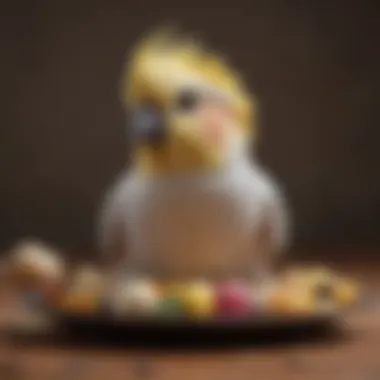
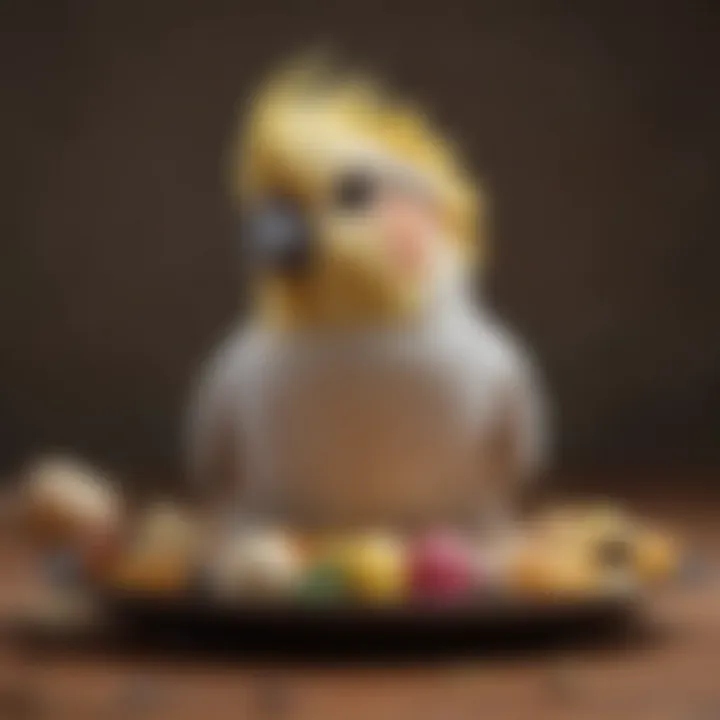
Cockatiels are one of the most popular pet birds, not just for their beauty but also for their charming personalities. Their ability to mimic sounds or whistles is a fun aspect and often endears them to their owners.
Historical and Cultural Significance of Birds
Birds hold cultural significance around the world, often symbolizing freedom and communication. Many societies have revered them, seeing them as messengers or harbingers of news through the ages.
Famous Bird Owners and Their Stories
From celebrities who own exotic birds to historical figures who included birds in their narrative, the stories are rich and varied. Their relationships with their avian companions have often inspired fans and followers alike.
Caring for a cockatiel is a commitment, full of joy and challenges. With the right knowledge, you shall create a wonderful life for your feathered friend.
Prolusion to Cockatiels
Cockatiels are a delightful presence in many households, offering companionship and entertainment with their playful antics and engaging behaviors. Understanding these birds is crucial for anyone considering welcoming them into their home. This section aims to pave the way for a deeper comprehension of cockatiels, encompassing their unique traits and the vital importance of proper care.
Characteristics of Cockatiels
Cockatiels, scientifically known as Nymphicus hollandicus, are a whimsical mix of character and charm. They boast a distinctive crest, which can be fluffed up or laid back, giving them an expressive demeanor that many bird lovers adore. Their plumage varies widely; some delight in the classic grey, while others sport vibrant yellows and oranges that can brighten up any room.
Cockatiels are intelligent, albeit sometimes a little cheeky. On one hand, they can mimic sounds, and many owners find joy in teaching them simple tricks or phrases. On the other hand, they can be quite sensitive, often reflecting their owners’ moods. Understanding their behavior is key to fostering a strong bond with them. Generally, they thrive in social environments and, unlike some of their more solitary avian cousins, they do best with interaction from their humans or other birds.
"Cockatiels are not just pets; they are companions that require affection and respect."
Significance of Proper Care
Proper care is not merely a matter of convenience; it's a fundamental aspect that profoundly impacts a cockatiel's health and happiness. Good care habits contribute to a strong bond between the bird and its owner, making their relationship enriching.
Maintaining an appropriate habitat, providing a balanced diet, and employing effective training strategies are all part of the full care picture. If any one of these areas is neglected, it can lead to a host of behavioral issues and health problems. For instance, improper diet might cause nutritional deficiencies, and a poorly designed cage can lead to stress and anxiety for the bird. Moreover, recognizing the emotional needs of a cockatiel ensures they feel secure and loved, which in turn promotes good behavior.
By dedicating the time and effort to understanding and providing appropriate care for cockatiels, owners can secure not just a pet but a happy, thriving companion. A knowledgeable approach to cockatiel care enhances both the bird's quality of life and the enriching experiences shared between the bird and its owner.
Creating the Ideal Habitat
Creating a suitable habitat for your cockatiel is fundamental in ensuring not just survival, but a happy and healthy life. The environment that you provide will shape their behaviors, emotional well-being, and social interactions. Whether you are a seasoned pet owner or new to this rewarding experience, understanding the essentials in habitat creation cannot be overstated. A well-thought-out habitat benefits not only the birds but also enhances the connection between you and your feathered friend, fostering trust and companionship.
Cage Size and Design
The first area to consider when setting up a habitat is the cage size and design. Cockatiels need space to flap their wings, exercise, and engage in normal behaviors. A cage that is too small can lead to stress and health complications.
A good rule of thumb is to choose a cage that is at least 24 inches wide, 24 inches deep, and 36 inches high; however, bigger is often better in this situation! The design is also crucial. Look for cages with horizontal bars, as they assist with climbing. Avoid cages with sharp corners or gaps that might lead to injury.
Essential Accessories
The right accessories can make a world of difference in the daily life of your cockatiel. These elements contribute enormously to their mental and physical well-being.
Perches and their Variations
Perches are one of the most critical accessories for your bird’s habitat. They should be made from natural wood rather than synthetic materials. Different sizes and shapes are highly encouraged. Varying perch diameters, such as those with rough textures, help keep your cockatiel's feet healthy and fit. This variety also stimulates their feet, keeping them active.
When choosing perches, consider those that have a natural branch-like design. The unique feature here is that it simulates their natural environment, which allows for greater comfort. Using a mix of soft and hard woods can also offer different textures, preventing boredom.
Bird Toys and Enrichment
Bird toys and enrichment are essential in creating an engaging environment. Toys that encourage physical activity and mental challenge are widely regarded as beneficial. For example, foraging toys that require them to work for food create added stimulation and mimic natural behaviors.
Additionally, hanging toys or those that promote swinging or climbing engage their instincts and promote a fit lifestyle. Look for toys made from safe materials, avoiding those painted with harmful chemicals. Remember to monitor any interacting, as some toys may wear out and become a potential hazard.
Environmental Considerations
It’s crucial to consider environmental factors that can affect your cockatiel’s well-being. The conditions in your home should reflect a safe, stable place for them.
Temperature and Humidity Levels
Cockatiels thrive in comfortable climates, ideally somewhere between 65°F - 80°F. Sudden temperature fluctuations can lead to health issues. Thus, it’s wise to position their cage away from doors and windows where drafts or extreme temperature can harm them.
Furthermore, humidity is also an important factor. Too dry or too humid can lead to respiratory problems. A little misting with water or using a humidifier during dry months could really help with providing a suitable atmosphere.
Minimizing Noise and Distractions
Minimizing noise and distractions in their environment plays a significant role in creating an ideal habitat. Cockatiels can be sensitive to loud sounds, which can stress them out. Attempt to place the cage in a quiet area of your home, away from television sets or other loud machinery.
Moreover, consider the overall environment that you provide. Focus on creating a space that easily calms, rather than overexcitement. Too much activity around them can lead to anxiety, affecting their psychological health.
"A calm and enriched environment leads to a happier and healthier cockatiel."
By being attentive to these aspects, you are not only enhancing their habitat but are laying down the foundation for a harmonious life together. With patience and attention, the bond between you and your cockatiel will flourish, leading to a richer experience for both you and your avian companion.
Understanding Cockatiel Nutrition
Understanding the nutritional needs of cockatiels is fundamental to their overall health and longevity. Just like humans, these birds require a balanced diet to thrive. Failing to provide proper nutrition can lead to a myriad of health issues, some of which might be irreversible. Recognizing what constitutes a well-rounded diet lays the groundwork not just for physical health, but also for behavioral well-being. This section will dive into the essentials, dissecting the types of food options available and common pitfalls that should be avoided.
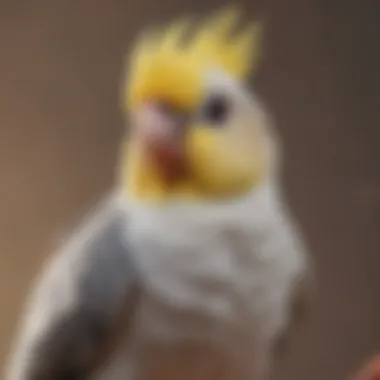
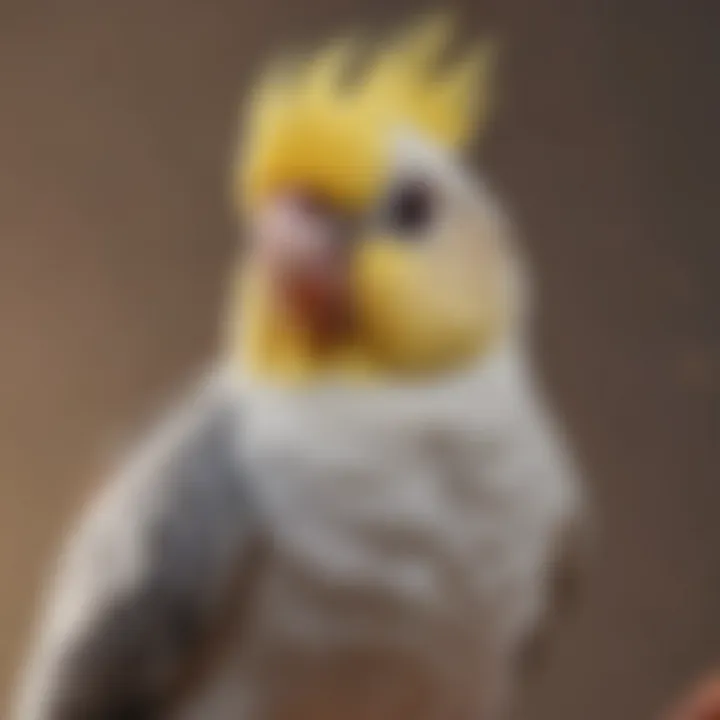
Balanced Diet Essentials
A balanced diet for a cockatiel is comparable to the varied menu you'd find at a multi-cuisine restaurant: it needs to include a little bit of everything. While it's tempting to feed them only seeds, a staple in many bird diets, it’s far from complete. The essentials comprise quality pellets, a good mix of seeds, and fresh produce. Pellets are particularly crucial because they are formulated to contain the right mix of nutrients tailored for these birds. They serve as a nutritional safety net, ensuring cockatiels get vitamins and minerals that seeds do not provide in sufficient amounts.
Incorporating fresh fruits and vegetables not only enhances the diet but also introduces variety, which keeps your feathered companion entertained and engaged during meal times. A cacophony of colors and textures will entice even the pickiest eaters. Hence, achieving balance isn't merely about variety; it's about health, enjoyment, and engaging those innate foraging behaviors.
Types of Food Options
Pellets vs. Seeds
The ongoing debate between pellets and seeds often leaves bird owners scratching their heads. Pellets are typically seen as a more nutritionally complete option. They are manufactured to provide a well-rounded distribution of vitamins, minerals, and necessary amino acids. Because they are less calorie-dense than seeds, pellets help mitigate the risk of obesity – a common issue among cockatiels that live a sedentary lifestyle.
Conversely, seeds come with a certain allure, perhaps because they are traditional and beloved. However, while seeds can serve as a rewarding treat, they shouldn’t form the bulk of the diet. A primary characteristic of seeds is their high-fat content, which can lead to health issues if consumed in excess. The choice between pellets and seeds should not be a stark either/or; rather, combining both can provide a happy medium that caters to your cockatiel’s desires while ensuring they remain healthy.
Fresh Fruits and Vegetables
When it comes to fresh fruits and vegetables, these are more than just decorative items on your cockatiel's plate. They are an essential part of their diet. Consider them the vibrant paint splashes on a dull canvas; they can spark both interest and nutritional benefits. Fruits like apples, berries, and melons are not only refreshing but pack antioxidants that contribute to overall health.
Vegetables—especially colorful ones like carrots, kale, and bell peppers—are rich in vitamins and enhance feather quality. Another key feature of integrating fresh produce is that it encourages your cockatiel to forage and explore different textures. However, it's important to note that certain fruits and vegetables should be given in moderation, such as avocado, which can be toxic in sizable amounts.
Common Dietary Mistakes
Often times, pet owners may stumble into some common traps when planning meals for their feathered friends. One prevalent mistake is relying solely on seeds. This restricted diet leads to nutritional deficiencies—think of it as a person living off candy alone. Improper proportions can also cause stress on the liver and kidneys over time.
Another pitfall is not varying the food offered. Birds thrive on routine but crave change; if your cockatiel sees the same meal day in and day out, it may become disinterested. Occasionally introducing new fruits or vegetables can keep their diet both exciting and health-promoting.
Supplementation Needs
Vitamins and Minerals
While the foundation of a cockatiel's diet should be built on well-balanced pellets and fresh produce, there are times when supplements are necessary. Vitamins and minerals fill in the cracks, especially in cases where the diet may fall short or if the bird is recovering from illness or stress.
Many natural food sources might not be enough to meet the heightened needs during these times. Thus, having a quality avian vitamin on hand can be a game changer. These supplements often contain all necessary vitamins, particularly Vitamin A and D3, which may be lacking in a seed-heavy diet.
Calcium for Optimal Health
Calcium plays a pivotal role in a cockatiel’s well-being, particularly for breeding or juvenile birds. Insufficient calcium can lead to serious consequences, such as weak bones or egg-binding in females. Special calcium supplements or cuttlebone should be offered regularly. This added calcium not only helps in the formation of strong bones and eggshells, but it also supports muscle function and nerve transmission.
Providing a steady supply of calcium-rich foods alongside the main diet ensures a cockatiel stays in tip-top shape while also feeding the natural instinct to peck at different textures, promoting mental health.
The right balance of diet not only keeps your cockatiel physically healthy, but also encourages them to experience life to its fullest, enriching their cognitive environment.
By mastering the nuances of cockatiel nutrition, bird owners can lay the groundwork for a long, healthy life filled with chirps and chatter.
Training Your Cockatiel
Training your cockatiel is an essential part of responsible care and can greatly enhance your relationship with your feathered companion. This section will dive deep into various elements that contribute to successful training practices. Cockatiels are known for their intelligence and affectionate nature, so training them not only hones their abilities but also strengthens the bond you share. Positive training not only helps them develop skills but also ensures a harmonious coexistence within your home. Thus, understanding the nuances of their behavior and employing appropriate training techniques can yield positive outcomes for both you and your cockatiel.
Understanding Cockatiel Behavior
Before embarking on training, it's crucial to familiarize yourself with cockatiel behavior. These birds are social creatures and typically thrive on interaction. They express emotions vividly and have distinct body language that can signal their feelings. For example, when a cockatiel raises its crest and flaps its wings, it might signal excitement or playfulness. Recognizing such cues can help you gauge whether your cockatiel is ready or willing to participate in training sessions.
Moreover, cockatiels are curious. They have a natural inclination to explore their surroundings, which can be harnessed during training. Using their curiosity to your advantage, you can introduce new commands or tricks in a playful manner that keeps your pet engaged. Understanding their behavior not only aids in crafting effective training sessions but also promotes a deeper connection between you and your cockatiel.
Positive Reinforcement Techniques
Positive reinforcement is a core principle in training cockatiels successfully. This approach involves rewarding your bird for desired behaviors, thus encouraging them to repeat those actions. Rewards can be varied—consider treats like millet sprays, verbal praise, or even affection, such as gentle petting.
For effective use of positive reinforcement, follow these steps:
- Choose Desirable Behaviors: Begin with simple tasks, like stepping onto your finger or mimicking a whistle. These small victories can lead to greater achievements.
- Timing is Key: Reward your bird immediately after it performs the desired behavior. This helps your cockatiel make the connection between the action and the reward.
- Build on Success: Gradually increase the difficulty of tasks as your cockatiel masters simpler commands. This scaffolding in learning keeps the training engaging and motivates your bird to continue.
Implementing positive reinforcement can turn what seems like a daunting task into an enjoyable experience. Staying patient and consistent is essential for achieving long-lasting results.
Socialization Strategies
Socializing your cockatiel is as vital as any training regimen. A well-socialized bird is more likely to adapt positively to various environments and stimuli. Here are a few strategies that can help in socializing your cockatiel:
- Gradual Exposure: Introduce your bird to different people, pets, and sounds slowly. This can lessen their anxiety and help them adapt to new situations.
- Positive Group Interactions: If possible, allowing your cockatiel to interact with other friendly birds can not only be educational for them but also fun. Birds often engage in play and can learn from one another.
- Regular Handling: Consistently spending time with your bird helps it become comfortable with your presence. Handling it gently and frequently will build trust and improve its confidence.
Fostering a positive socialization experience is crucial for your cockatiel's well-rounded development.
Common Training Challenges
While training cockatiels can be rewarding, it's not without its hurdles. Here are some common challenges you might encounter along the way:
- Attention Span: Cockatiels may have short attention spans, so keeping training sessions brief and dynamic can prove beneficial. Aim for quick, engaging sessions to maintain their interest.
- Fearfulness: Sometimes, cockatiels may encounter new experiences with trepidation. Patience is vital. Always approach them calmly and allow them time to acclimate.
- Stubbornness: Like many pets, cockatiels can be a tad stubborn. If they exhibit reluctance to perform a trick or command, revisiting previous tasks may help build their confidence.
By identifying these challenges early on and addressing them with a solid training plan, you can navigate through obstacles and foster a successful learning environment for your cockatiel.
Health and Wellness Management
Maintaining the health and wellness of your cockatiel is a cornerstone of responsible ownership. These birds are naturally vibrant and social, but without proper health management, they can easily suffer from a variety of issues. By focusing on a consistent health routine, pet bird owners can prevent many ailments and promote a long, fulfilling life for their feathered friends. From regular check-ups to understanding symptoms of common illnesses, getting a grasp on health management keeps your cockatiel happy and thriving in their environment.
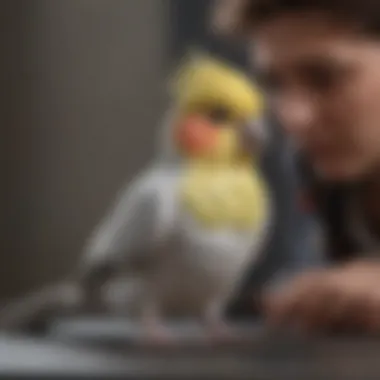
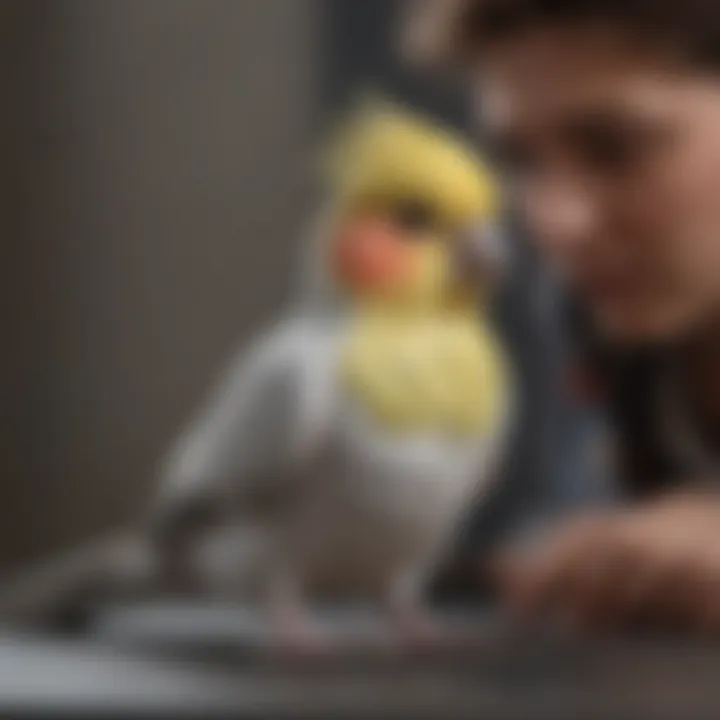
Routine Health Checks
Conducting routine health checks is a vital part of staying ahead of potential health issues. These checks should become a regular habit, akin to brushing your teeth—something you just do. You might want to set aside some time every few weeks to observe your cockatiel closely. Look for signs of any behavioral changes, or check their feathers for excessive molting, which might indicate nutritional deficiencies or stress.
A few things to include in your health check routine are:
- Weight Monitoring: Weigh your cockatiel regularly to spot any unwanted weight gain or loss. A sudden change can signal an issue needing attention.
- Feather Condition: Examine the feathers for any signs of damage or bald patches. Ideal feathers should be glossy and plump, reflecting good overall health.
- Nail and Beak Grooming: Check that their nails are not overgrown and their beaks are in good shape. Overgrown beaks can affect feeding and lead to other complications.
Taking the time to perform these checks can make a world of difference. Keeping an eye out for issues early means you can take action before something escalates.
Identifying Common Illnesses
Understanding the signs of common illnesses helps pet owners react swiftly. Cockatiels can face various health concerns, ranging from respiratory infections to feather plucking. It’s essential to be aware of the warning signals your bird might display. Just knowing what to look for can save critical time and enhance the outcome of any treatment.
Some common symptoms to watch for include:
- Changes in Appetite: If your cockatiel suddenly stops eating or seems uninterested in their food, that can be a red flag.
- Lethargy or Reduced Activity: While cockatiels enjoy quiet moments, prolonged lethargy should not be ignored.
- Loud or Unusual Sounds: Changes in vocalization can indicate stress or discomfort.
- Discharge in Nose or Eyes: Any discharge can signal an illness that needs immediate attention.
As with anything, knowledge is power. The more informed you are, the better equipped you will be to handle potential health issues.
Importance of Veterinary Care
Regular veterinary care plays a significant role in the overall health of your cockatiel. It's easy to overlook this aspect, but making the effort to have your cockatiel examined by a vet who specializes in avian care can catch problems early. Avian vet visits should be scheduled at least once a year, but consider more frequent checks for older birds or those with a history of health concerns.
During these veterinary visits, your bird can receive:
- Comprehensive Health Assessments: The vet will check weight, feather health, and physical condition, offering insights you might miss.
- Vaccinations: Keeping on schedule with vaccinations helps guard against potential diseases.
- Nutritional Advice: Vets can provide tailored diet recommendations to ensure your cockatiel is getting everything it needs from its food.
"An ounce of prevention is worth a pound of cure.” - This adage rings especially true for cockatiel care.
Investing in veterinary care strengthens your bond with your pet and encourages a preventative approach to their wellbeing. Show your feathered friend you care by prioritizing their health, making it a core part of your pet care routine.
Fostering Interaction and Bonding
Building a solid relationship with your cockatiel isn’t just about keeping them well-fed and housed; it also involves fostering interaction and bonding. This aspect of bird-keeping is critical as it directly influences their overall well-being. When cockatiels feel connected to their human companions, they're more likely to exhibit a variety of positive behaviors, from chatter and playfulness to affectionate interactions. Here are some key elements to consider in the quest for a strong bond with your feathered friend.
Creative Playtime Activities
Engaging your cockatiel in playful activities is a delightful way to enhance your bond. Think of their playtime as a mix between a fun circus act and a riveting playdate. You don’t need to fancy gadgets; simple toys that encourage them to climb, chew, or puzzle over things can work wonders. Here are a few ideas to get the wheels turning:
- Foraging Toys: These toys allow cockatiels to engage their natural instinct to search for food, which can keep them mentally stimulated and entertained.
- Swing Sets: A good swing can tickle a cockatiel’s fancy and encourage them to test their acrobatics. Swinging is not just enjoyable; it promotes physical health.
- Interactive Games: Simple games, like showing them a mirror or playing introductory tricks, can be a fantastic way to encourage interaction.
Establishing a routine that includes designated playtime can deepen your connection and introduce an element of fun into their life.
Establishing Trust and Comfort
Trust is the cornerstone of any relationship, and the bond with your cockatiel is no different. They need to feel safe and comfortable in their environment before they’ll truly open up. Slowly introducing them to your presence is important. Instead of reaching into their cage immediately, allow them to observe you from a distance. Speak softly and offer treats to help bridge the gap. Here are some trusted strategies:
- Consistent Approach: Regularly interact with your cockatiel around the same time each day. Predictability can create a safe haven for them.
- Gentle Handling: When the time comes to handle them, ensure that your movements are slow and gentle. Quick or jerky movements can startle them.
- Respect their Space: Every cockatiel is unique; knowing when to take a step back is equally important as knowing when to move closer. If they seem uneasy, don’t push it.
In time, your cockatiel will learn to trust you, leading to a blooming relationship.
Recognizing Your Cockatiel's Mood
Like humans, cockatiels have their share of moods. Recognizing these moods can transform your interactions, making them more meaningful. They communicate how they feel through body language and vocalizations. Here are some signs to look for:
- Fluffed Feathers: If your cockatiel is puffing up, they might be feeling chilly or threatened, so it’s best to give them space.
- Chirping or Whistling: Happy sounds can indicate that your cockatiel is in a good mood, signaling it's time for a little interactive play.
- Biting or Avoidance: If your bird shows signs of aggression or wants to retreat, it may be feeling stressed. Understand these cues and adjust your approach accordingly.
"Birds, like us, thrive in environments where they feel secure and seen. Understanding their moods can be the key to a harmonious cohabitation."
By being mindful of their moods, you not only strengthen your bond but also tailor your interactions for more joyful experiences.
In summary, fostering interaction and bonding with your cockatiel requires time and commitment. A mix of creative play, trust-building, and mood awareness can enhance their quality of life and deepen the connection you share. The more you invest in this relationship, the richer it becomes, creating a rewarding experience for both you and your feathered companion.
Epilogue
As we wrap up this guide, it’s vital to recognize the significance of each element discussed. Giving proper care to a cockatiel encompasses more than just feeding and housing. It’s about creating an environment that meets their needs and fosters happiness. The interconnectedness of habitat, nutrition, and training cannot be overlooked. Each contributes uniquely to the overall health and well-being of these lively birds, ensuring they lead fulfilling lives.
Addressing the habitat is the foundation; it sets the stage for every cockatiel's daily life. If the space is crafted thoughtfully—with enough room to move, play, and exercise—owners will likely find their feathered friends are more content and less prone to behavioral issues.
When it comes to nutrition, understanding the balance of the diet is essential. A mix of pellets, seeds, and fresh foods enables nurturing of their bodies and brains. Cockatiels thrive on variety, which helps prevent boredom and nutritional deficiencies.
Training plays a crucial role as well. Beyond teaching tricks, training fosters a bond and provides mental stimulation. Positive reinforcement creates a trusting relationship, which is beneficial for both the bird and the owner. This kind of interaction when done correctly can make a world of difference in the cockatiel’s behavior and overall demeanor.
In summary, providing optimal care for cockatiels involves recognizing the importance of these aspects. A holistic approach will yield a stronger bond and a happier bird. Whether one is a seasoned owner or a newcomer, a commitment to continuous learning can only benefit both the cockatiel and its guardian.
Recap of Key Points
- Cockatiels require a suitable habitat that includes appropriate size, design, and enriching accessories to flourish in a home environment.
- Nutrition plays a fundamental role in their health, emphasizing the balance between formulated diets and fresh produce.
- Training enhances bonding and overall happiness, using positive reinforcement as a core practice to develop trust and reduce behavioral challenges.
Through these focused areas, owners can significantly improve their cockatiels' quality of life. The journey of caring for these birds is ongoing and requires dedication and awareness.
Encouraging Lifelong Learning
One of the remarkable aspects of caring for cockatiels is the endless journey of learning that awaits every owner. Engaging with communities online, seeking advice from experienced pet bird owners, and staying updated on best practices can significantly enhance the cockatiels’ care.
- Consider joining forums and relevant subreddits like r/Cockatiels to exchange tips and experiences with other bird enthusiasts.
- Reading articles from reputable sources such as Britannica or Wikipedia can broaden understanding and inspire new ideas for care.
- Regularly visiting your vet, especially if you notice a change in behavior, ensures that your cockatiel’s health stays in check and avoids common pitfalls.
This pursuit of knowledge not only benefits the bird but also enhances the overall experience for the owner. A well-informed guardian is better equipped to address challenges and celebrate the delightful moments of cockatiel care.















